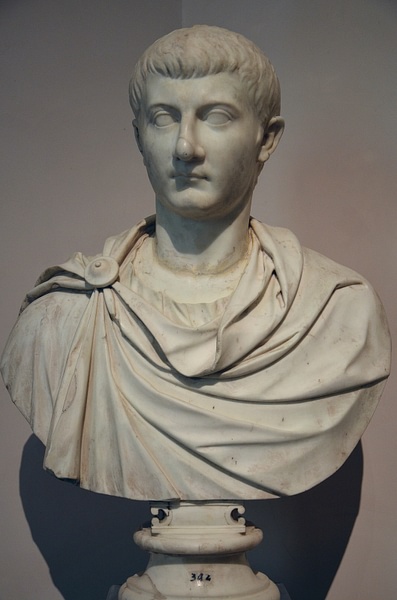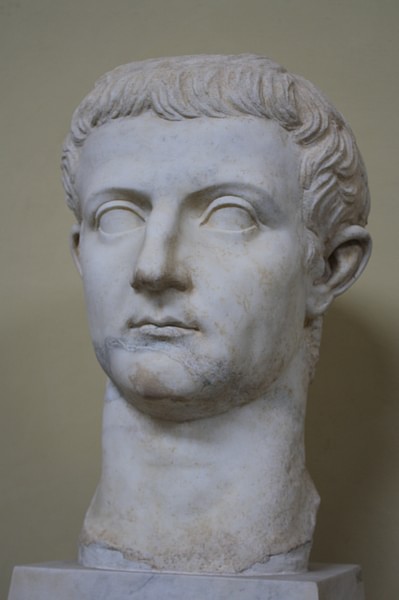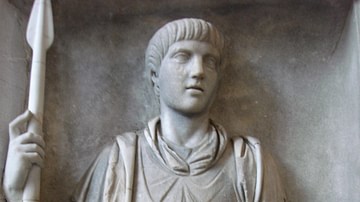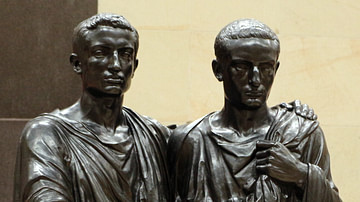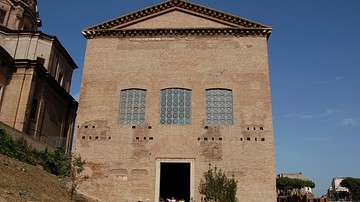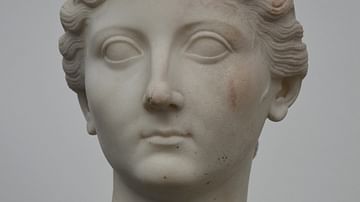
Lucius Aelius Seianus or Sejanus (20 BCE-31 CE) was the commander of the praetorian guard under the emperor Tiberius (14-37 CE). Coming from an obscure equestrian family, he managed to become one of the closest advisor of Tiberius, hoping to become his successor or a regent to a young heir. After the death of Drusus, Tiberius' son, he started to persecute all his possible rivals, a task he made easier by driving Tiberius into paranoia and convincing him to retire to Capri in a self-imposed exile. In the end, though, Tiberius grew suspicious of his minister and his ambitions, and ordered his execution. Sejanus' children and many of his friends fell with him in a bloody political purge.
YOUTH & EARLY CAREER
Lucius Aelius Seianus was born presumably in 20 BCE in the Etruscan city of Volsini. His father was Lucius Seius Strabo, a wealthy equestrian that became praetorian prefect in 2 BCE. Even though his family was not noble, it was very important; Sejanus' grandaunt, in fact, was the wife of Maecenas, one of Augustus' most trusted advisors. We know very little of Sejanus' early career: he probably followed Gaius Caesar, Augustus' nephew, in his mission in the Eastern Provinces, and may have been a favorite of the famous gastronome Apicius - even though we do not know if he really prostituted him, as Tacitus claims, or not. Sejanus married a woman named Apicata, who gave him three children.
Upon Augustus' death, in 14 CE, Strabo enrolled his son in the praetorian prefecture. The new emperor, Tiberius, sent Sejanus with his own son Drusus to quell a mutiny in Pannonia. Shortly after, Strabo was made praefect of Egypt, leaving his son alone in his office. Even though we know very little of Sejanus' first years as sole praefect, it is certain that he managed to link himself to the imperial family, as he was allowed to engage his daughter Iunilla to the future emperor Claudius' son. The boy, though, died, ruining Sejanus' plans. Around the same time, he was allowed to build the Castra Praetoria in Rome, a permanent camp for the members of the Praetorian Guard. His influence, understandably, grew afterwards.
ADVISOR OF TIBERIUS
The ambitious Sejanus drove Tiberius into paranoia, telling him that the city was divided & that there was a 'part of Agrippina' which could be a danger to the State.
Tiberius surely trusted him, seeing Sejanus as a competent minister (he had even helped to put down a blaze in the Theatre of Pompey in 22 CE, and he was rewarded with a statue for that); the emperor's son Drusus, however, did not. In fact, he could not accept that a man of such low birth could be so greatly honoured by the emperor. He even struck Sejanus during a quarrel. However, in 23 CE, Drusus died. Ancient sources suggest he was killed by Sejanus, whose ambitions induced him to seduce Drusus' wife, Livilla, who was convinced by the devious minister to help him to kill her husband. However, everybody thought Drusus died from an illness, as he was very well known for his excesses.
After Drusus' death, Nero and Drusus Julius, the children of Germanicus, the intended heir apparent who had died back in 19 CE, and the energic Agrippina, became more and more prominent. The ambitious Sejanus started driving Tiberius into paranoia, telling him that the city was divided and that there was a 'part of Agrippina', which could be a danger to the State. From 24 CE onward, then, Sejanus began abusing the laws of treason to eliminate Agrippina's friends. In 25 CE, Sejanus asked Tiberius to marry Livilla, but the emperor refused the request. The scorned praefect, then, began convincing his master to retire, a desire the emperor had been cultivating for some time. He had never wanted to rule, being fundamentally a Republican, and he greatly disliked making decisions. Only his well-rooted sense of duty had prevented him from retiring. In 26 CE, finally, Tiberius retired South to Rome, first to Sperlonga, then (in 27 CE) to Capri.
Even though Tiberius never left Sejanus as de facto ruler, as he always remained more or less solvent to his duties, we can assert that Sejanus' influence during the emperor's absence greatly increased. Between 27 and 29 CE, Sejanus launched the final attack against Agrippina: she was first put under house-arrest in Herculaneum; then, she was definitively exiled with Nero. Drusus followed their fate in 30 CE. They were all dead by 33 CE, either starved to death or driven to suicide. Sejanus, meanwhile, was bestowed great honours: for example, it was voted that his name would be included in oaths, and altars to Amicitia and Clementia were dedicated to him and Tiberius. The emperor also promised Sejanus to share with him the consulship of 31 CE. His birthday was made a public celebration and senators began flattering him to get Tiberius' favours.
SEJANUS' FALL
However, Tiberius soon grew suspicious of his minister's ambitions. He probably feared that Sejanus was plotting to remove or to kill him. Then, he acted slyly: he began promising Sejanus even greater honours, and probably also allowed him to marry Livilla; in the meantime, he began showing indirectly that the praefect had lost his favour. For example, he left the consulship in May and forced Sejanus to do the same; he began criticizing some of Sejanus' friends while praising others; and in his letters to the Senate, he stopped including Sejanus' titles. He began showing affection for his nephews Gaius (better known as Caligula), the last surviving son of Germanicus, and Tiberius Gemellus, Drusus' son, whom he summoned to Capri. This ambiguous behaviour led some friends of Sejanus to leave his friendship.
As soon as he saw that the number of Sejanus' supporters had diminished, Tiberius secretly appointed Sutorius Macro as praetorian prefect and sent him to Rome with precise instructions. In the night between 17th and 18th Macro entered Rome and met the praefect of vigiles, Laco, and the consul Regulus; the next day, he met Sejanus before the temple of Apollo on the Palatine, where the Senate meeting was to be held. Macro told him that a letter had arrived from Capri which would confer him the tribunicia potestas; the sign that he was to be the next emperor. However, when the letter was read, it only contained ambiguous words. Tiberius first praised him, then criticized him and asked, at the end, to put Sejanus under arrest along with two senators linked to him.
Sejanus was immediately brought to Tullianum, Rome's jail. The people of Rome were happy, as they could not forget what Sejanus had done to Agrippina, whom they loved. Sejanus' statues were torn down by an angry mob before his very eyes. The Senate soon met to decide Sejanus' fate, sentencing him to death. He was strangled, his body exposed on the Gemonian stairs and then thrown in the Tiber (after being abused by people for 3 days); damnatio memoriae was issued on his name, and statues representing him were destroyed. His children too died in the general hysteria; his daughter, who was a virgin thus being immune from capital punishments, was raped before being strangled. Apicata, who was repudiated by Sejanus several years before he married Livilla, decided to take revenge and sent Tiberius a letter, revealing to him, truthfully or not, that Sejanus and Livilla had killed Drusus. Then, she committed suicide. Tiberius became desperate and paranoid, and Livilla soon perished after the reading of Sejanus' letter. By 33 CE, most of Sejanus' friends and relatives were dead.

